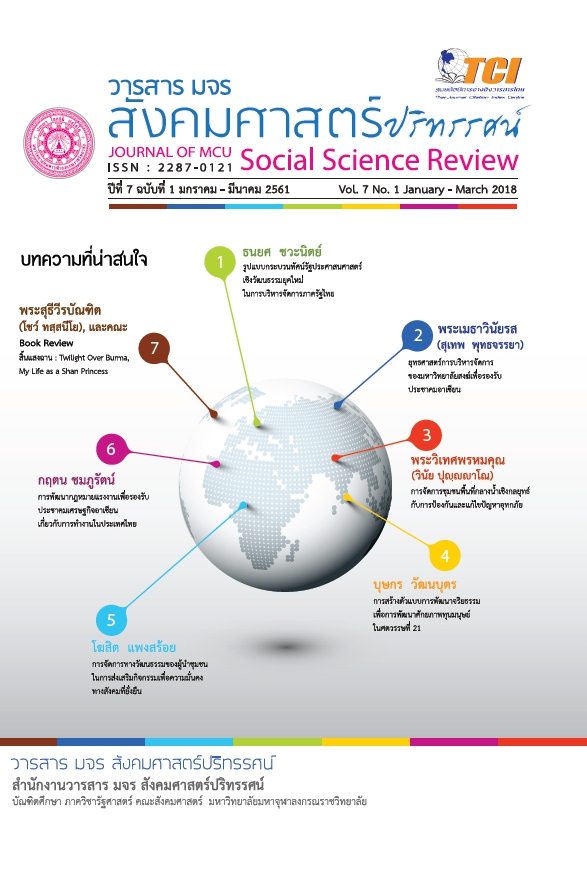บทบาทด้านการศึกษาสงเคราะห์ของวัดและพระสงฆ์ต่อเด็กด้อยโอกาสทางการศึกษาในพื้นที่ชายแดนแม่สอด
คำสำคัญ:
เด็กด้อยโอกาสทางการศึกษา, การศึกษาสงเคราะห์, การศึกษาพหุวัฒนธรรมบทคัดย่อ
บทความนี้เป็นการศึกษาสงเคราะห์บทบาทหนึ่งที่สำคัญของคณะสงฆ์ไทยนับจากอดีตจนถึงปัจจุบัน การศึกษาครั้งนี้เน้นการศึกษาข้อมูลสนามเพื่อวิเคราะห์ถึงบทบาทด้านการศึกษาสงเคราะห์ที่วัดและพระสงฆ์ในพื้นที่ชายแดนแม่สอดจัดให้แก่เด็กด้อยโอกาสทางการศึกษา ซึ่งผลการศึกษาพบว่าลักษณะของเด็กด้อยโอกาสทางการศึกษาในพื้นที่ชายแดนแม่สอด ประกอบด้วยเด็กยากจน เด็กที่ไม่มีสถานะทางทะเบียนราษฎร เด็กไทยบนพื้นที่สูง และเด็กถูกทอดทิ้ง โดยเหตุปัจจัยของความด้อยโอกาสทางการศึกษามาจาก (1) ความแตกต่างในด้านชาติพันธุ์ ภาษา และวัฒนธรรม (2) ความยากจน (3) สถานที่ไม่เอื้ออำนวยในการจัดการเรียนการสอน (4) ขาดแคลนครู (5) หลักสูตรไม่มีความเหมาะสมกับเด็ก และ (6) การไม่มีสถานะทางทะเบียนราษฎร์ของเด็ก จากเงื่อนไขความด้อยโอกาสทางการศึกษาดังกล่าวนี้วัดและพระสงฆ์ในพื้นที่ชายแดนแม่สอดจึงเข้ามามีบทบาทในการสนับสนุนด้านการศึกษาสงเคราะห์ใน 3 ลักษณะ คือ (1) โรงเรียนพระพุทธศาสนาวันอาทิตย์ (2) โรงเรียนเอกชนการกุศลของวัด และ (3) ศูนย์พัฒนาเด็กเล็กภายในวัด โดยมีหน่วยงานทั้งภาครัฐและภาคเอกชนเข้ามามีส่วนร่วมในการสนับสนุนการศึกษาเป็นจำนวนมาก อย่างไรก็ตามการจัดการศึกษาของวัดและพระสงฆ์ยังขาดความเหมาะสม ผลการศึกษาวิจัยนี้จึงเสนอแนวทางสำคัญในการสร้างเสริมโอกาสทางการศึกษาสำหรับเด็กในพื้นที่ชายแดนด้วยการจัดการศึกษาพหุวัฒนธรรม ซึ่งแนวทางดังกล่าวจะช่วยแก้ไขปัญหาเรื่องความแตกต่างทางชาติพันธุ์ ภาษา และวัฒนธรรมของเด็กในพื้นที่ชายแดนแม่สอด รวมถึงเสริมสร้างโอกาสทางการศึกษาให้เด็กด้อยโอกาสสามารถเข้าถึงระบบการศึกษาในท้องถิ่นได้อย่างเท่าเทียมกันมากยิ่งขึ้น
เอกสารอ้างอิง
Khanungnit Juntabut. (1989). Status and Role of Budhist in Thailand. Bangkok:
The religious association for Social.
Office of the Basic Education Commission. (2016). Guidelines for Project of
Education Cost Support Management from Kindergarten through Elementary Education in Fiscal Year 2559. Bangkok : Office of the Basic Education Commission.
Office of the Education Council. (2016). Education Statistics of Thailand Academic Year 2557-2558. Bangkok : Office of the Education Council.
Phrakhru Wisutthananthakhun. (2016). Dhamma Educational Administration of Sangha In Photharam District, Ratchaburi Province. Journal of MCU Social Science Review, 5(2), 15 - 30.
Phramaha Somsong Sirintharo. (1982). Role of Buddhist Monastery and Thai Monks in the Future. Bangkok : kledthai Publishing Co., Ltd.
Phramaha Sunan Sunantho (Ruchiwet). (2016). Buddhist Integrated Approach to The Management of Buddhist Schools. Journal of MCU Social Science Review, 5(2), 31-42.
Premjai Vungsiriphaisal. (2010). Development of Model and Guidelines for Educational Management for Immigrant Students A Case Study of Maesot District, Tak Province Research Report. Bangkok: Office of The Education Council.
Wanlaya Manutkasemsirikul. (2008). Process of Education Management for Migrant Children by NGOS: A Case Study of Maesot District, Tak Province Master’s thesis. Bangkok : Chulalongkorn University.
ดาวน์โหลด
เผยแพร่แล้ว
รูปแบบการอ้างอิง
ฉบับ
ประเภทบทความ
สัญญาอนุญาต
ลิขสิทธิ์ (c) 2019 วารสาร มจร สังคมศาสตร์ปริทรรศน์

อนุญาตภายใต้เงื่อนไข Creative Commons Attribution-NonCommercial-NoDerivatives 4.0 International License.
เพื่อให้เป็นไปตามกฎหมายลิขสิทธิ์ ผู้นิพนธ์ทุกท่านต้องลงลายมือชื่อในแบบฟอร์มใบมอบลิขสิทธิ์บทความให้แก่วารสารฯ พร้อมกับบทความต้นฉบับที่ได้แก้ไขครั้งสุดท้าย นอกจากนี้ ผู้นิพนธ์ทุกท่านต้องยืนยันว่าบทความต้นฉบับที่ส่งมาตีพิมพ์นั้น ได้ส่งมาตีพิมพ์เฉพาะในวารสาร มจร สังคมศาสตร์ปริทรรศน์ เพียงแห่งเดียวเท่านั้น หากมีการใช้ภาพหรือตารางหรือเนื้อหาอื่นๆ ของผู้นิพนธ์อื่นที่ปรากฏในสิ่งตีพิมพ์อื่นมาแล้ว ผู้นิพนธ์ต้องขออนุญาตเจ้าของลิขสิทธิ์ก่อน พร้อมทั้งแสดงหนังสือที่ได้รับการยินยอมต่อบรรณาธิการ ก่อนที่บทความจะได้รับการตีพิมพ์ หากไม่เป็นไปตามข้อกำหนดเบื้องต้น ทางวารสารจะถอดบทความของท่านออกโดยไม่มีข้อยกเว้นใดๆ ทั้งสิ้น





